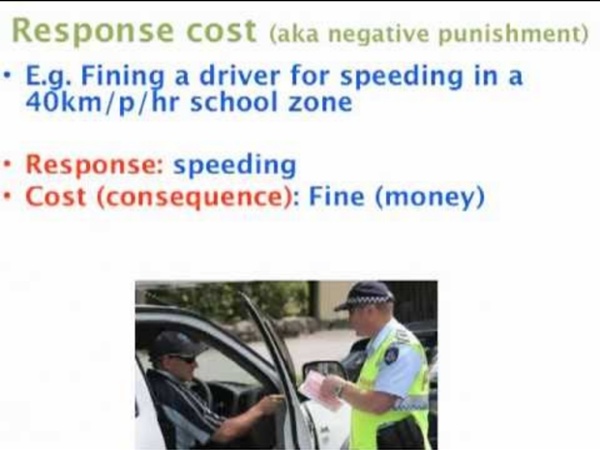



http://www.youtube.com/watch?v=astF0YjP-KY
Related: Striving for Safer Roads with Reinforcement and Punishment • Should we be using Reinforcement or Punishment to influence our teenage children? • Shaping Teenagers' Behaviours • TMA01 Part01 • phgoh003The Study of Punishment in Psychology Punishment is a term used in operant conditioning to refer to any change that occurs after a behavior that reduces the likelihood that that behavior will occur again in the future. While positive and negative reinforcements are used to increase behaviors, punishment is focused on reducing or eliminating unwanted behaviors. Punishment is often mistakenly confused with negative reinforcement. It’s Not Discipline, It’s a Teachable Moment WHETHER facing a toddler temper tantrum or an insolent adolescent, every parent struggles to find the best way to discipline children. But many parents fail. A recent study found that 1 in 3 say the methods they use simply don’t work.
A first-hand account of the effects of peaceful parenting from a teen. I often get questions from parents unconvinced of the effectiveness of my parenting techniques. Fueled by a steady diet of conventional parenting rules concerning time-outs, control, punishment, and praise, as well as personal reflections on their own childhoods, they ask questions like: “Does this stuff really work?” “How do kids learn about consequences if they aren't punished?” “Have you ever had to deal with a child having a meltdown in the middle of the grocery store?” I have a whole page on my website of letters from parents who have written heartfelt testimonials about the successful implementation of peaceful parenting. Positive vs. Negative Reinforcement: A Guide for Parents – Generation Mindful I almost stopped bringing them to the playground. With two children under the age of 4, playgrounds had been a place of respite for me. I could sit on the bench and catch up with some parent friends while my littles jumped, slid, and climbed to their heart's content in a controlled setting.
What is Negative Punishment (Examples and Effectiveness) In this article, we will review negative punishment, its definition, examples, and drawbacks. American psychologist B.F. Skinner developed the theory of operant conditioning, which stated that a person or animal’s behavior could be increased or decreased by adding or removing appropriate stimuli after the behavior is exhibited. The difference between classical conditioning and operant conditioning is that classical affects unconscious behavior, while operant affects conscious behavior. Within operant, punishment aims to reduce a behavior while reinforcement increase a behavior.
What Is Reinforcement in Operant Conditioning? One of the many different ways in which people can learn is through a process known as operant conditioning (also known as instrumental conditioning).1 This involves learning through reinforcement or punishment. The type of reinforcement used can play an important role in how quickly a behavior is learned and the overall strength of the resulting response. Understanding Reinforcement Reinforcement is a term used in operant conditioning to refer to anything that increases the likelihood that a response will occur.
Rewarding behavior is key to parenting teens, study suggests Parenting is hard, and parenting teens brings about an entirely new set of challenges, from keeping their rooms clean to getting them home before curfew. But, a new study suggests parents who want their teenagers to keep their grades up could have better success if they focus more on rewarding good behavior and less on threatening to punish the bad. According to the report, published in PLOS Computational Biology, British researchers have found that adolescents focus well on positive incentives, but have difficulty staying motivated to avoid penalties. The study shows that teens and adults learn in different ways, according to the study’s lead author Stefano Palminteri, a researcher with the Institute of Cognitive Neuroscience at University College London.
Teen brains may have an advantage — better learning Teens can get a bad rap for their behavior. They tend to be more sensitive to rewards than to punishments. Indeed, teens tend to seek out rewards more than do adults or young kids. Those reward-seeking behaviors can cause nightmares for the adults in their lives. But a teen’s big interest in rewards might have an upside, a new study finds. Teens may tap it to learn some new things better than adults do. Reinforcement Vs. Punishment for Kids (And Examples) As they grow, our children learn which behaviors are acceptable and which are not. They learn this through a process of cause and effect. Here’s an example of how this works: When you touch something hot, it burns and you take your hand away. Then, you remember it burns and you don’t touch the hot item again. This is cause and effect. The same principle applies to how you teach your child about their actions and behaviors.